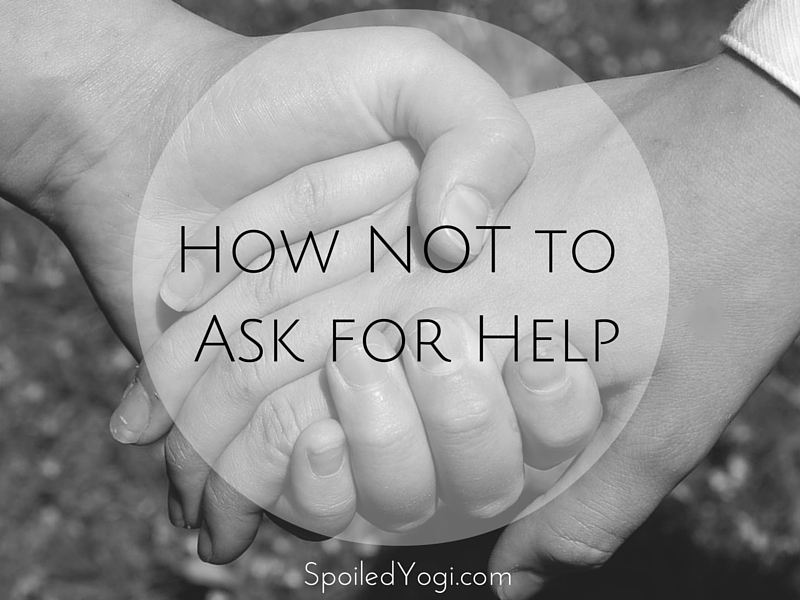
Before my daughter was born, I thought I’d be able to do everything all by myself. I remember thinking: How hard could it be to keep an 8-pound being alive and happy? I knew I’d lose a little sleep at night, but I’d take advantage of her daily naps to get all my freelance work done during the day. Keeping up with all of it wouldn’t be so bad. Maybe I’d even get some reading done during my maternity leave—I mean, what else would there be to do while I was nursing that baby for hours on end? It’s funny (and kind of sad), isn’t it?—the way people who have never been mothers totally underestimate how hard and life-changing and amazing (all at once) the job of mom really is… (This is something I really wish I could change so maybe new moms (and, you know, ME!) wouldn’t feel so alone and inadequate, but I digress…)
See also 10 Ways Motherhood Has Changed My Yoga Practice
At first it didn’t even bother me that, when my husband had to go back to work, he put in ear plugs and covered his eyes with a mask at night so he could get some sleep without disruption. After all, he had to go to work the next day and I was just going to be at home nursing a baby and doing laundry. It didn’t take very long, though, until I began to glare at him and his dumb eye mask and annoying snoring every time I woke up in the middle of the night to feed the baby. When I started having writing assignments and deadlines on top of it, I felt alone, desperate for a break, and, well angry that I had so little support and help during the days and nights and no space or uninterrupted time to pursue my work.
Of course, this was my choice. I wanted to stay home with the baby. I quit my full-time job to pursue writing, teaching yoga, and parenting full-time. It was my dream—exactly what I’d been working toward for years. It was still hard as shit.
I felt like a big, fat failure, but I didn’t want to admit it by hiring a babysitter or doing something crazy like actually ask for help from my partner. I just wanted my husband to see that I was struggling and step in. And I expected him to read my mind. I did what any sleep-deprived, stressed out, proud new mama would do. I complained. A lot.
Now, I know this is going to come as a huge surprise to you, but complaining and whining and sighing loudly and glaring at my poor husband didn’t actually make him want to put on the suit of armor hanging in the back of his closet (beside his neatly pressed and hung clothes because somehow he still had time to keep up with his laundry) and come to my rescue. For some mysterious, unknown reason my complaints and put-downs only made my husband look for ways to get as far away from me as possible. He mowed the lawn a lot. I got even angrier. I glared at the lawn mower. I complained more. And so it went for many, many months…
(I should note here that, now that I look back on it, I can see that my husband actually WAS very helpful during those weeks and month. He brought home dinner. He put away the dishes. He helped how he could. I just had a really hard time seeing it during my sleep-deprived, agitated, hormone-crazed, angry stupor.)
See also 10 Ways to Trick Your Husband Into Doing Yoga
We turned a corner, thank goodness, when I stopped being such a jerk. I decided to stop complaining so much (if you know me, you know how hard this is for me—I’m a whiner by nature.). I made an effort to appreciate all the ways he WAS helping and supporting me instead of dwelling on all the things I wished he would do. (Coincidentally, this took place about the time our sweet daughter decided to sleep more than two hours at a time, but it was still progress.) All of a sudden, things didn’t seem so bad. And, I noticed a change in my husband, too. It wasn’t an overnight transition, but we stopped yelling at each other and started working together. We were both happier and everything went much more smoothly. I learned a lot about asking for help that first year and, more importantly, how NOT to go about demanding asking for help from your partner when you need him the most.
How NOT To Ask for Help from Your Partner
1. Complain about all the ways you wish your partner were doing things differently.
Let’s be honest. There are probably a few things he wishes you’d do differently, too—like brush your hair every once in a while. But honing in on all the things you see as flaws will both cause you to miss all the ways he’s being helpful and supportive and very likely make him want to help you even LESS.
2. Compare your tasks and to-do lists with him and expect things be even.
Trust me, no one wins this game. You’re both working hard. You might take on more of the chores at home right now, while he earns more income. Or maybe the roles are reversed. Maybe one of you pitches in more one week while the other one is knee-deep in deadlines. Next month might be the opposite. It’s never going to be completely even, but as long as both of you are working hard to make your household run as smoothly as possible, that’s all that matters. Appreciate and praise the things that your partner does. even if he isn’t spending his time the way you would. Remember that people who feel appreciated might actually feel motivated to do more! Besides, you’ll feel much happier and more content that way, too.
See also How Competition is Zapping Your Energy and Ruining Your Life
3. Put down the work that your partner is doing.
As I mentioned earlier, I used to get SO annoyed by the amount of time my husband spent on yard work. I’d say that it wasn’t important—that there were a million other more important things he could be doing with his time, things that would actually help me! This was an epic failure on my part. Yes, he was choosing to do a chore that maybe he enjoys more than other chores. I do that, too. (I’m blogging right now, when I should be cleaning up toys for the 15,400th time today, for example.) But putting down his efforts just drove a big wedge between us and made me feel even more alone.
In the end, none of the daily chores really matter that much… The dishes and laundry can pile up. The world won’t stop if you use disposable diapers (and paper plates!) until you feel more caught up. You can let the dust bunnies accumulate in the corners for months without it becoming a health hazard (I would know. I’ve tested the limits on this one). But you can’t get back this precious and special time you have together as a new family. The memories will stay with you forever. I’m grateful for the lessons I learned during this transition, but if I could go back and do things a little differently during those months, I’d spend a lot more time smiling and a lot less time glaring.
*Featured image by Elizabeth Ann Colette

Comments